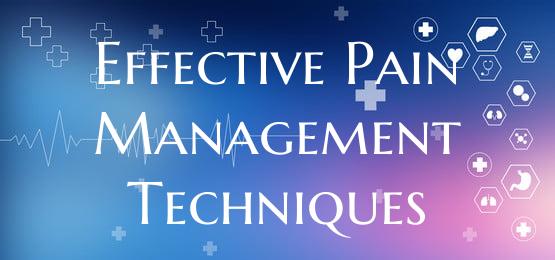
Effective Pain Management Techniques
Pain is a complex and challenging experience that can significantly impact one's quality of life. Whether acute or chronic, finding effective pain management techniques is essential to alleviate discomfort and improve overall well-being. Implementing a comprehensive approach that combines medical interventions, lifestyle modifications, and alternative therapies can help individuals better manage and reduce pain. Here are some proven techniques for effective pain management:
1. Medication Management: - Consult with a healthcare professional to determine the most suitable medication for your type of pain. - Take medication as prescribed and communicate any side effects or concerns to your healthcare provider. - Explore a combination of over-the-counter and prescription medications to find the right balance for pain relief.
2. Physical Therapy and Exercise: - Engage in physical therapy sessions to strengthen muscles, improve flexibility, and enhance mobility. - Incorporate low-impact exercises such as walking, swimming, or yoga to manage pain and maintain overall physical health. - Practice proper body mechanics to prevent further injury and reduce pain related to movement.
3. Mind-Body Practices: - Consider mindfulness meditation, deep breathing exercises, or progressive muscle relaxation to alleviate stress and reduce pain perception. - Attend cognitive-behavioral therapy sessions to develop coping strategies and improve pain management skills. - Explore alternative approaches such as acupuncture, massage therapy, or biofeedback to complement traditional pain management methods.
4. Healthy Lifestyle Choices: - Maintain a balanced diet rich in nutrient-dense foods to support overall health and manage inflammation. - Get an adequate amount of sleep to promote healing and reduce pain sensitivity. - Avoid tobacco and limit alcohol consumption to optimize pain management outcomes.
5. Support System: - Build a network of supportive family members, friends, or a pain management support group to share experiences and receive emotional encouragement. - Communicate openly with healthcare providers about your pain levels, treatment effectiveness, and any concerns or challenges you may face. - Seek professional counseling or therapy to address emotional distress and develop coping mechanisms for dealing with chronic pain.
By incorporating a combination of these effective pain management techniques into your daily routine, you can empower yourself to better control and minimize the impact of pain on your life. Remember that pain management is a personalized journey, and it may require time and experimentation to find the strategies that work best for you. Prioritize self-care, seek support when needed, and stay proactive in managing your pain for improved overall well-being.